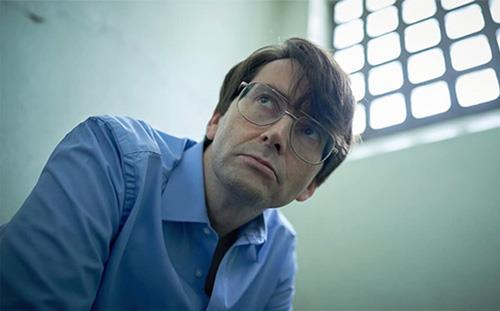
Dennis Andrew Nilsen, who murdered at least 15 men in Britain between 1978 and 1983, stands out even in the netherworld of serial killers.
The apparent impenetrability of Nilsen's psyche, plus David Tennant's (top) skill in conveying that chilling elusiveness, made Des, a three-part dramatization of Nilsen and his crime, a breakout hit in the U.K. earlier this year.
It crosses the pond to the U.S. to premiere Thursday on Sundance Now, which is part of the AMC+ package.
It doesn't have the presale here that it did in the U.K., where the real-life Nilsen is well remembered for the matter-of-fact nature of his confession.
Still, at a time when true-crime dramas seem to be one of America's go-to TV choices, Tennant makes Des compelling.
It also doesn't require a long commitment. With three episodes running a bit more than 45 minutes each, it isn't much longer than a movie.
So Des, titled after Nilsen's preferred name for himself, doesn't waste a lot of time on setup. We know Nilsen is a serial killer almost before we know there were serial killings.
The police, led by Detective Peter Jay (Daniel Mays), have been summoned to check out the odd discovery of what seem to be human bones lodged in a drainpipe.
They wait around until the owner of the flat at the top of the drainpipe, Nilsen, returns from his civil service job. They walk upstairs with him and ask him where the rest of the body is. He lights the first of many cigarettes and says something like, "Oh, you mean bodies. There have been 15 of them."
The crime part of the mystery here is thus immediately rendered tangential.
Des murdered young men, usually homeless and jobless that he picked up on the street or in bars. He took them home, sometimes gave them a meal, then drowned or strangled them.
Their encounters were so brief he barely knew their names, and now he says he can't remember them. So Jay and his team first must start identifying the victims, or else a case becomes hard to make even with Nilsen's confession.
The police, and potential biographer, Brian Masters (Jason Watkins), also start trying to figure out why this quiet loner started killing people at the age of 32.
He didn't do it for sex. He didn't do it for money. He didn't do it for revenge. He didn't seem to do it for thrills.
He didn't enjoy the nuts and bolts of disposing of the bodies. He seemed generally disconnected from what he had done, recounting it to Jay, other detectives, and his lawyers with no more emotion than if he were describing how he did his laundry.
With one episode each from the viewpoint of Jay, Nilsen, and Masters, Des eventually gets under the surface to find some clues about what drove him and why he seems to feel so detached.
It was an unsettling case at the time in Britain primarily because of this apparent indifference. Even if a killer's reasons are horrific, at least they're reasons.
Des comes closer to echoing Kinky Friedman's song about Eagle Scout Charles Whitman, who shot a couple of dozen strangers at the University of Texas in 1966 and was killed himself before any clue to a motive could be discovered.
"Most folks couldn't figure just why he did it," Friedman sang. "And them that could would not admit it / There's still a lot of Eagle Scouts around."
Not much is scarier than the idea of random amoral killers because that makes anyone a potential victim.
Des is about the efforts of the law and a writer to find an explanation. It's a disturbing dig.